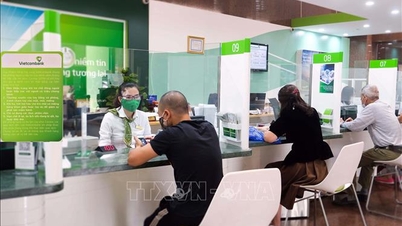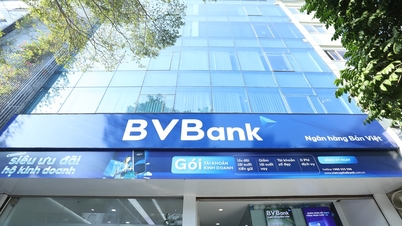Bad debt of the whole system exceeds 5%
The sharp increase in bad debt has caused the provision for credit risk to skyrocket, not only eroding the profits but also the Tet bonus funds of bank employees. This has made the atmosphere of the New Year's Eve parties of some credit institutions become reluctant. Even the General Director of a financial leasing company under a large commercial bank had to leave the New Year's Eve party because he was "not in the mood to party" - according to a subordinate shared with VietNamNet.
Previously, the company meetings were very tense, revolving around the classification of bad debts of corporate customers. Should we keep the debt group or let it jump to another group? Will continuing to support businesses in restructuring their debt help them recover their production and business? These have always been the concerns of leaders of credit institutions in recent times.
“Profit in 2023 before provisioning is about 250 billion VND. After provisioning, there is only more than 100 billion VND left. At this point, the hope of receiving a Tet bonus is very slim. There has never been a year with such a gloomy atmosphere as this year,” an employee of the above company told VietNamNet.
At the Press Conference on the Implementation of the Banking Industry's Tasks in 2024 held in early January, Mr. Pham Chi Quang, Director of the Monetary Policy Department, SBV, said that although the SBV has operated very flexibly with synchronous solutions, bad debt has increased rapidly in recent times, and now the bad debt ratio of the whole industry has exceeded 5% of the total outstanding debt of the whole system.
Bad debt of credit institutions is determined to include debts overdue for 3 months or more, corresponding to group 3 debt (substandard debt), group 4 debt (doubtful debt) and group 5 debt (debt with potential loss of capital).
According to regulations, credit risk provisions gradually increase from 20% for group 3 debt, to 50% for group 4 debt and 100% for group 5 debt.
The financial reports of the fourth quarter of 2023 of banks show that the increase in group 5 debt compared to 2022 occurs in most banks.
At BIDV , group 5 debt increased by 8.33% to VND 12,868 billion in the context that all debt groups increased compared to the end of 2022.
At VietinBank , group 5 debt skyrocketed by 50% to nearly VND9,400 billion as of December 31, 2023. Group 4 debt also increased by 108% to VND4,700 billion. Positive information is that group 2 debt (debt requiring attention) and group 3 debt at VietinBank both decreased sharply compared to the end of 2022.
The bad debt figure at Vietcombank is even more worrying as this is the fourth consecutive year that bad debt has increased in both absolute value and ratio.
As of December 31, 2023, Vietcombank's bad debt reached VND 12,455 billion, an increase of 59.3% compared to the end of 2022 and accounted for 0.98% of the bank's total outstanding debt, while this rate was 0.68% in 2022, 0.64% in 2021 and only 0.62% in 2020.
Notably, Vietcombank's bad debt increased by 18% to more than VND7,800 billion by the end of 2023. In contrast, credit risk provision expenses decreased sharply by 51.8% to VND4,565 billion.

Sadness is not personal
Bad debt in general and group 5 debt also increased sharply at commercial banks, even those banks with low risk appetite.
Bao Viet Commercial Joint Stock Bank (BVBank) said that the bad debt ratio by the end of 2023 had increased to 3.31% (2022 was 2.79%). BVBank had to increase provisions in the last quarter of the year, with credit risk provisioning costs reaching VND135 billion, up 34% over the same period. Accumulated for the whole year, credit risk provisioning costs were nearly VND280 billion, up 23% compared to 2022. Therefore, at the end of 2023, pre-tax profit reached nearly VND72 billion, down 84% compared to 2022.
However, the optimistic signal for BVBank is that 2023 marks a successful transition to the personal loan segment. If in the period 2019-2022, the average personal loan proportion only accounted for 54% of the total outstanding debt, by 2023, this figure had reached 70%.
Aiming to become a retail bank with a customer segment mainly consisting of individuals will help to diversify the level of risk, thereby gradually improving asset quality.
The same thing happens with retail banks like VIB when lending to businesses and individuals often accounts for over 80% of total outstanding loans (84.41% in 2023 and 89% in 2022).
However, VIB's credit risk provisions also increased by 39% year-on-year to more than VND4,200 billion. In 2023, VIB also recovered more than VND692 billion of debt that had been handled in previous years (an increase of 83% compared to 2022).
VIB's bad debt by the end of 2023 is 2.2% (1.79% in 2022). However, group 5 debt decreased by 10% compared to the end of 2022 to VND2,200 billion.
Or like Exmbank, bad debt increased from 1.8% at the beginning of the year to 2.65%. This forced the bank to set aside nearly 700 billion VND for credit risk provisions (7 times higher than the previous year). Therefore, pre-tax profit decreased by 27% to 2,720 billion VND.
At ACB, although the bank has always had a low bad debt ratio, debt in all three groups has increased over the past year. Currently, the bank's bad debt is more than VND 5,800 billion, a sharp increase of 93% compared to the end of 2022 and accounting for 1.2% of total outstanding debt. ACB's credit risk provisioning costs also increased dramatically from VND 70 billion in 2022 to VND 1,804 billion in 2023.
TPBank is also always considered a bank that controls bad debt below 1%. However, by the end of 2023, the bad debt ratio at this bank was 2.04%, reaching 4,200 billion VND.
According to banks, the impact of high capital mobilization interest rates in the market in the last months of 2022 and the first quarter of 2023 has significantly increased the cost of paying interest on deposits in 2023. Along with the increase in bad debt due to customer difficulties, the cost of provisioning has also increased, affecting profits.
Source






![[Photo] Da Nang: Hundreds of people join hands to clean up a vital tourist route after storm No. 13](https://vphoto.vietnam.vn/thumb/1200x675/vietnam/resource/IMAGE/2025/11/07/1762491638903_image-3-1353-jpg.webp)






































































































Comment (0)